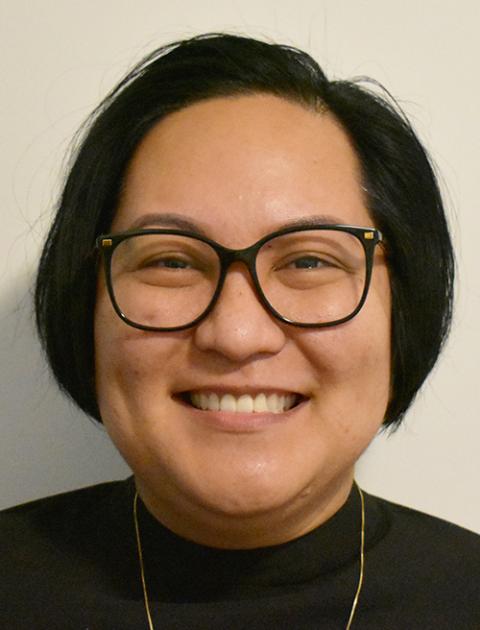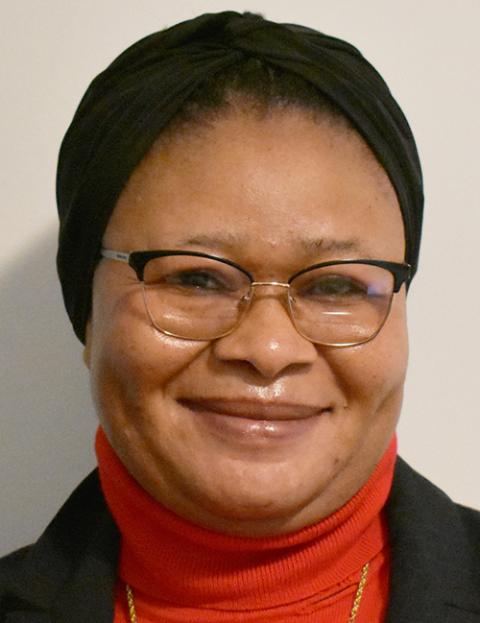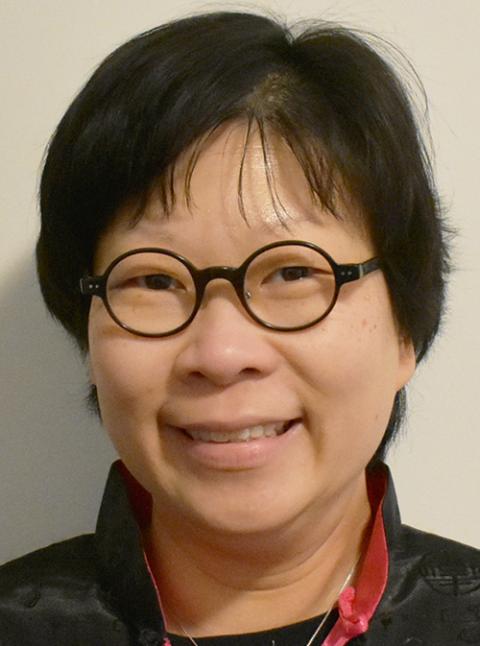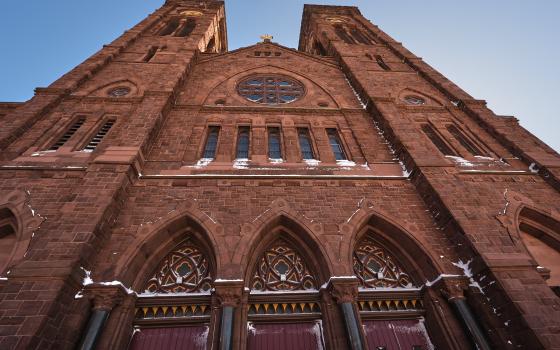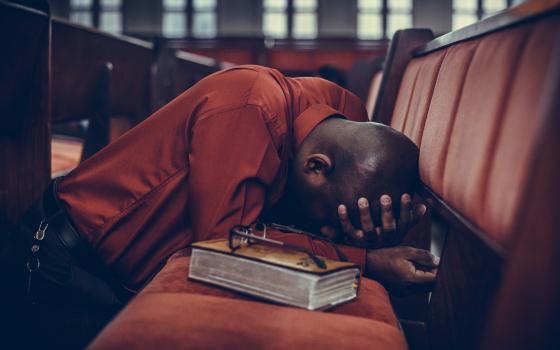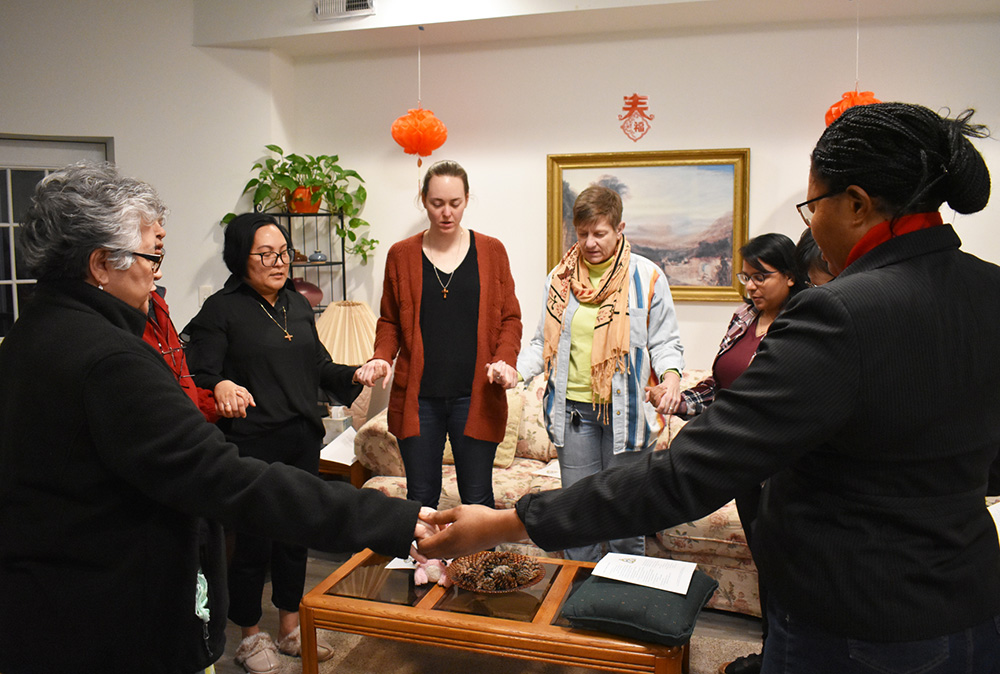
At the conclusion of evening prayer at the InterCongregational Collaborative Novitiate in Chicago, the novices and the codirectors gather to simultaneously recite the Lord's Prayer, each in her native language. (Julie A. Ferraro)
Being able to laugh while trying to learn the steps to an African dance, experience a liturgy at a Ukrainian Church, or discuss facets of Black History Month has been an integral part of the past eight months for a group of six novices, who have bonded into a distinct community.
The 2022-23 members of the InterCongregational Collaborative Novitiate cohort have found that, in addition to the program allowing them to continue their personal and vocational discernment, they are also gaining an appreciation of each other's cultural traditions, and those of the surrounding neighborhood of Hyde Park in Chicago.
In some cases, the area's diversity means they also can connect with others of their culture. "I've made friends with the Filipino sacristans," Grace Ramos said of the nearby parish, St. Thomas the Apostle.
For this novice with the Sisters of St. Joseph of Orange, who is originally from Bulacan in the Philippines, relationships are important. She has created quite a few during these months: with the other five novices, at the parish, where everybody knows each other, and at Catholic Theological Union, where she's gotten to know even more religious men and women.
Besides being excited to join the current cohort at the InterCongregational Collaborative Novitiate, nurturing these relationships broadens how she sees this time as a gift. "It's so much fun."
Grace grew up in Southern California, earning bachelor's degrees in nursing and management before deciding to enter religious life. Being in Chicago is quite a different experience.
"One thing I like is that I can walk everywhere," Grace said. "It's a blessing that we're right next to the lake." Lake Michigan is just a few blocks from the novitiate.
"Home" for the novices for the year they are in the program is on three floors of a multilevel apartment house in Chicago's Hyde Park neighborhood. The location is near numerous institutions of higher education — Catholic Theological Union, the University of Chicago, the Lutheran School of Theology at Chicago and the McCormick Theological Seminary, among others — and various religious communities of men and women. While the program emphasizes the intercultural aspects of living together, it continues the novitiate process of learning about the charisms of their respective communities and religious life in general.
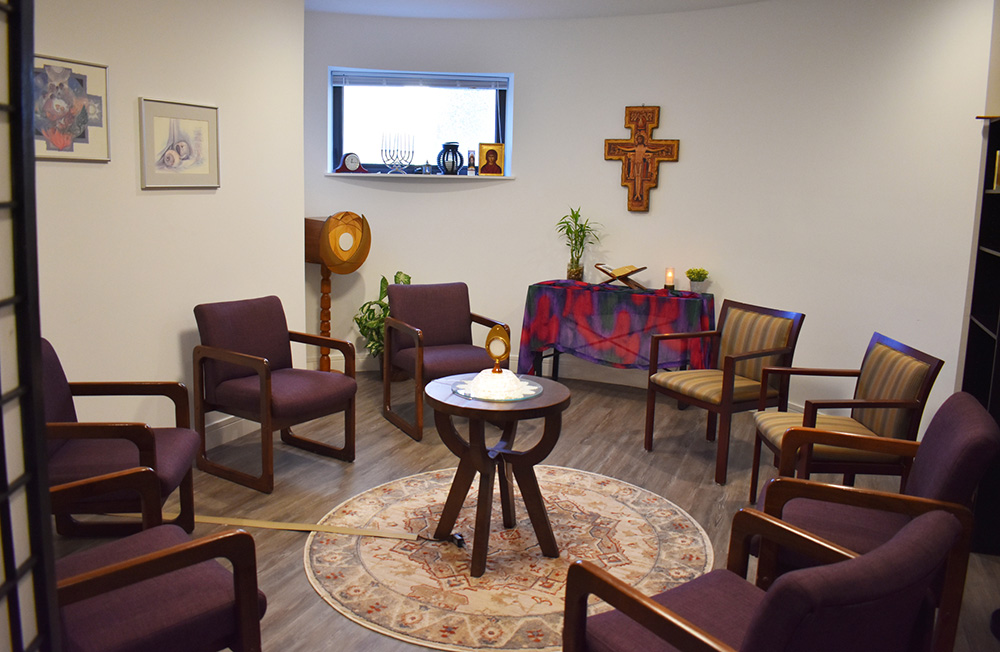
The garden level chapel at the InterCongregational Collaborative Novitiate in Chicago provides sacred space for prayer and Mass. (Julie A. Ferraro)
The InterCongregational Collaborative Novitiate was developed after extensive brainstorming among a diverse committee organized by the Religious Formation Conference as a way to bring novices — who might otherwise go through their religious community's formation program alone — together as an intentional community. The program takes a year in what is usually a two-year novitiate. The project was funded in part by a grant from the Conrad N. Hilton Foundation, which also funds Global Sisters Report.
From its first cohort of two novices from the Sisters of St. Joseph of Orange, California, during the 2021-22 year, co-directors Sr. Nancy Gerth of the Sisters of Charity of Nazareth and Sr. Corrina Thomas of the Franciscan Sisters of Perpetual Adoration built on that experience. They recognized the need for more living space to expand the number of novices who could participate in the program, to enrich the intentional community dynamic.
Like any relocation, when the novices arrived in August 2022 — ranging in age from their 20s to 60s — they were a bit nervous and scared, according to Sister Corrina, who is originally from India. They were accompanied during the first few days by their "home formators," the sisters who serve in formation roles in the respective communities.
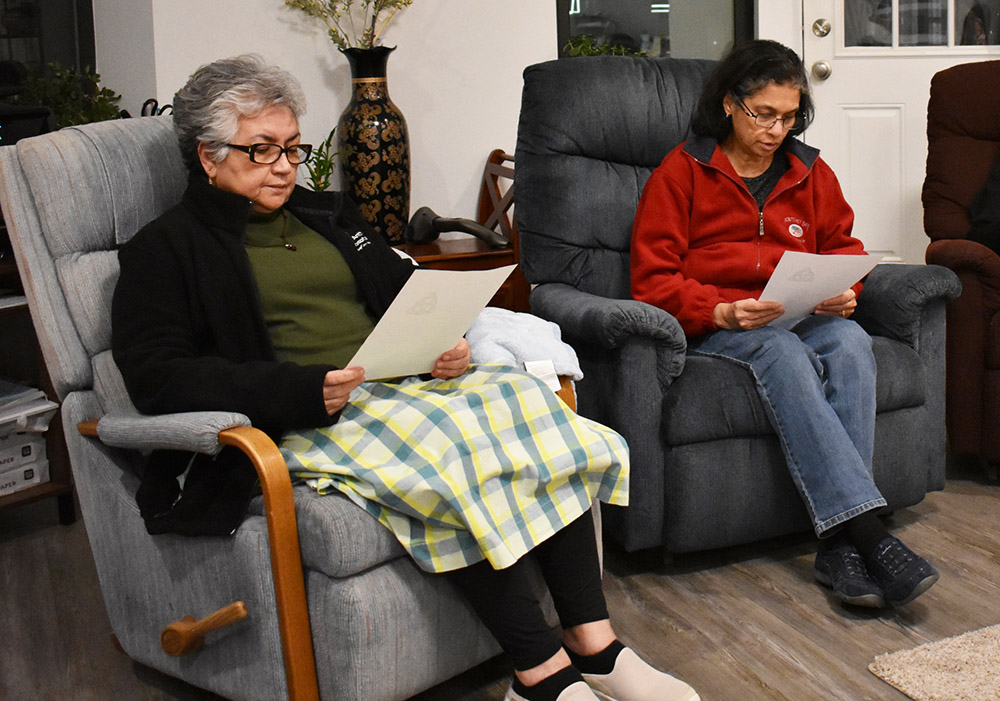
Novice Alba Luz Mejia Solis, left, and Sr. Corinna Thomas participate in Evening Prayer at the InterCongregational Collaborative Novitiate in Chicago. (Julie A. Ferraro)
"The novices are from six congregations, six age groups, six different cultural backgrounds or countries — about as 'inter' as you can get," Sister Nancy explained.
After the women were settled, Sister Nancy and Sister Corrina took them to a retreat house for an orientation session. As each novice shared her story, it became clear to the co-directors that something special was developing.
"They really plumbed the depths from day one," said Sister Corrina. "It was a good bonding time."
Maribah Ishaq discovered almost immediately that the United States is more broad-minded than her home country of Pakistan, where she joined the Sisters of Loretto at the Foot of the Cross in 2020. Away from the conservative atmosphere, she noted, "Here, I am my true self. I don't have to worry about what I wear or what I say."
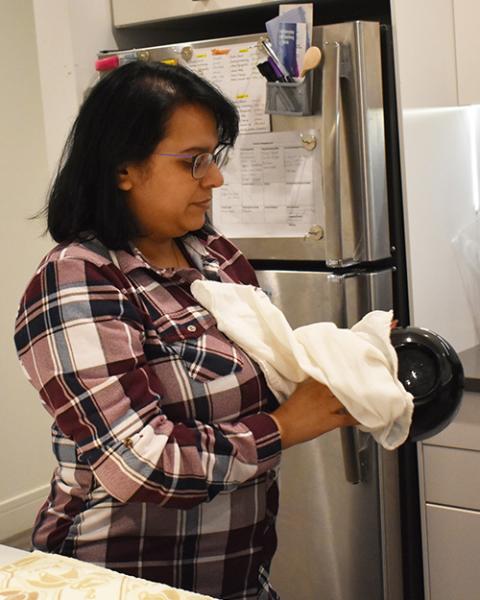
Maribah Ishaq, novice with the Sisters of Loretto at the Foot of the Cross, dries the dessert dishes at the InterCongregational Collaborative Novitiate in Chicago. (Julie A. Ferraro)
The directors noticed the novices' adjustment to their new life took about a month — give or take a few weeks, as the novices themselves reflected.
"It was a huge learning curve," Sister Nancy said. "They had to learn the city, where things are in the house, who are these people I'm living with, and get used to the daily and weekly schedule."
That schedule includes classes on alternate Mondays via Zoom (or in person) with their home formators, and with Sister Nancy and Sister Corrina on more general topics related to religious life on the other Mondays.
On Fridays, the novices with the InterCongregational Collaborative Novitiate gather with novices from other religious communities for one-day workshops with speakers on a wide range of topics as part of the Intercommunity Novitiate, facilitated by the Divine Word Missionaries on the Catholic Theological Union campus. The sessions encourage discernment and interaction between religious communities, and offer ways to broaden perspectives among the participants.
The novices of the InterCongregational Collaborative Novitiate also audit classes at Catholic Theological Union rather than enrolling for credit, as Sister Nancy noted, so they aren't distracted from their formation by having to complete homework assignments or write papers.
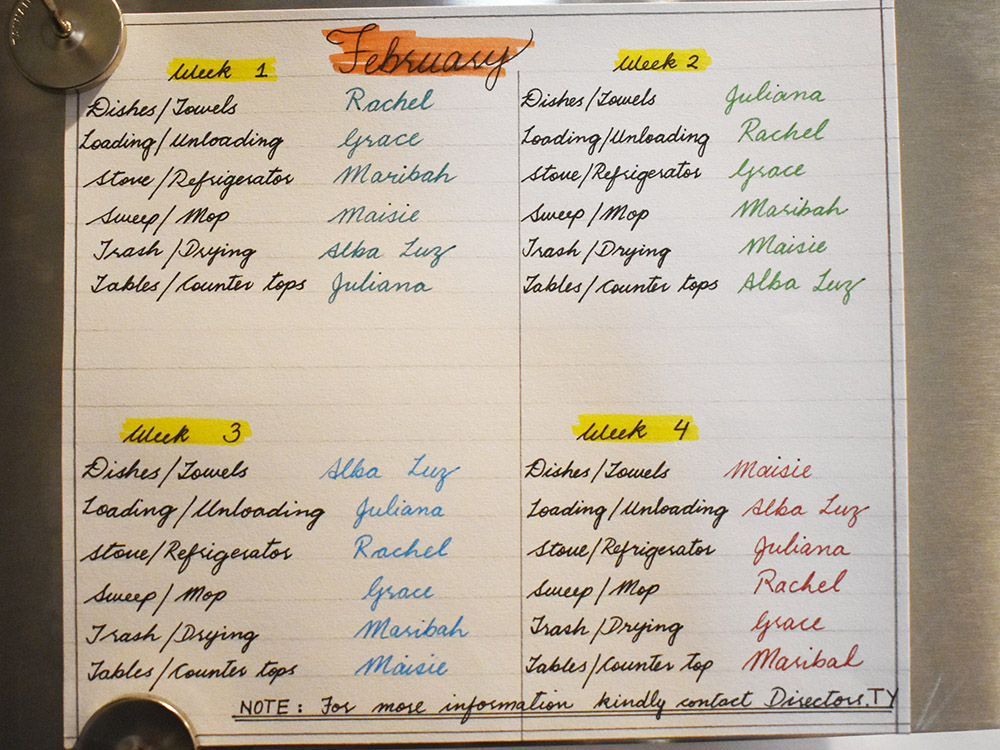
The novices take turns with cleaning chores around the house, as this schedule on the refrigerator shows. (Julie A. Ferraro)
With more than seven months of the program behind them, the novices have formed an intentional community that flows through the days, on both a spiritual and practical level, sharing cleaning duties, grocery shopping, cooking and use of the washer and dryer.
Besides the practical aspects of living together, Maribah appreciates the insights she has been given into Franciscan, Precious Blood and Presentation spirituality. "I think I'm in heaven right now," she laughed. "There's so much joy, I cannot control it."
She related how she sees herself in the light of a native story about a frog in a well. Life, she added, is about more than just what's in the well, and she has been able to discover that in this intercultural setting. "I'm really thankful to my community for giving me this opportunity to enter the big sea."
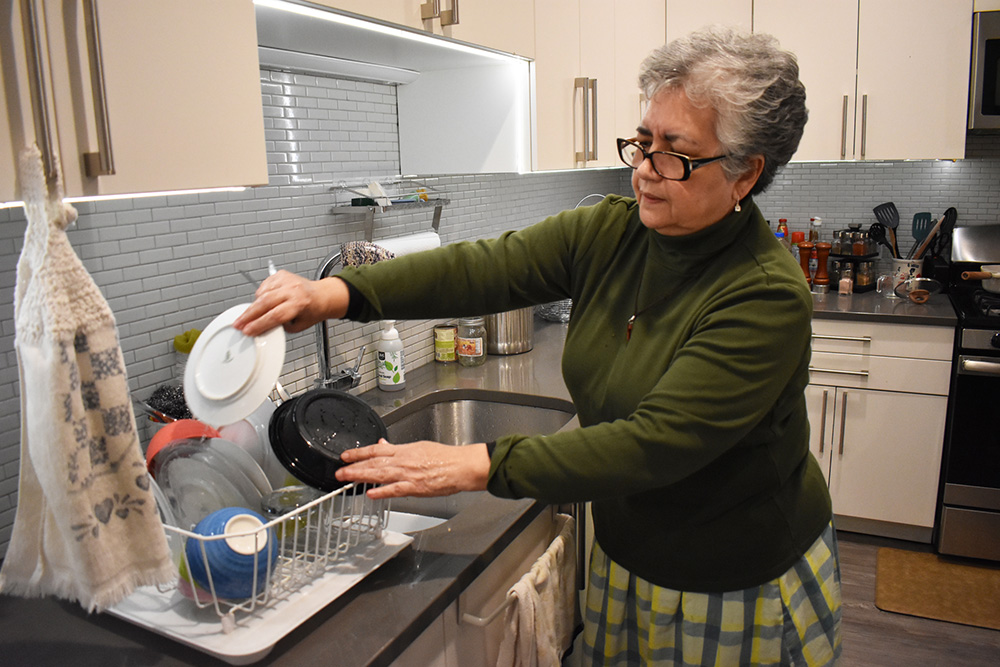
Alba Luz Mejia Solis, novice with the Franciscan Sisters of Allegany, washes the dessert dishes at the InterCongregational Collaborative Novitiate in Chicago. (Julie A. Ferraro)
Alba Luz Mejia Solis, a novice with the Franciscan Sisters of Allegany, New York, is the eldest of the women in this cohort. She grew up in Honduras and trained as a catechist from an early age. She moved as an adult to Miami, where she served 450 families in a mission, many of them immigrants and refugees, pretty much on her own.
"The priest asked 60 people to help," she recalled of the mission's beginnings. "I was the only one who stayed."
She credits God with giving her the energy to perform the many tasks. "I opened myself to him, and he did the rest."
Meeting members of the religious community during that time, Alba joined the Franciscans in 2018 and became a novice in 2019. The COVID-19 pandemic interfered with her formation, but it has resumed.
Advertisement
She brought a knowledge of different cultures to the novitiate, having worked with people from her own country, as well as Jamaica, Haiti and others at the mission. "Even though we are different cultures, there are things in common," she said. "We are the same in the eyes of God."
If more people understood that, Alba reflected, there could be peace in the world.
A novice with the Sisters of the Precious Blood in Dayton, Ohio, Juliana Wuur moved from Ghana to Columbus, Ohio, nearly six years ago. In addition to navigating the challenges of the immigration system — obtaining a work permit, a permanent ID and so forth — she says she has experienced the racism prevalent in the U.S.
Being part of the InterCongregational Collaborative Novitiate cohort is a place of growth for her, she said. That includes integrating herself with those of different cultures, which she sees as a rich opportunity. "I cherish mine; I respect the others'. It's really good to learn from each other."
She has shared much of what she has learned with her community in Dayton, encouraging them to send future novices to join the InterCongregational Collaborative Novitiate. A fear that, due to the various charisms involved in the collaborative novitiate, a novice might decide to leave her community and join another is unfounded, Juliana said. "When you love the charism, you'll never change your mind."
In attending classes with members of other communities, Juliana sees that the future of religious life is bright, primarily because of the opportunity to collaborate with the other novices, and those of other religious communities in the area. "This is a place for you to learn," she noted, "if you are able to cope with all the weather."
In 1996, Maisie Ng came from Hong Kong to Toronto, where she worked two jobs and ran an online business. During a trip to Assisi, Italy, in 2016, while praying in the Basilica of St. Clare, a profound insight spurred a change in her lifestyle. A series of events led her to the Sisters of St. Francis of the Neumann Communities, entering in 2021.
Being part of the InterCongregational Collaborative Novitiate cohort offers a different dynamic from life with members of her community. "It's like having siblings with me," she said. "You don't have to go to your parents all the time."
Living with her peers in religious life is a plus at this stage of her formation, Maisie said. Initially, though, she was uncertain what would be involved, especially since she hadn't previously lived in an intercultural setting. "I didn't know what it would look like."
Her Franciscan sisters supported her journey from Pittsburgh, where she spent her first year with a small group of sisters. "They told me, 'You're going to have a great year because of the diversity.' "
She added, "I didn't understand then, but I do now."
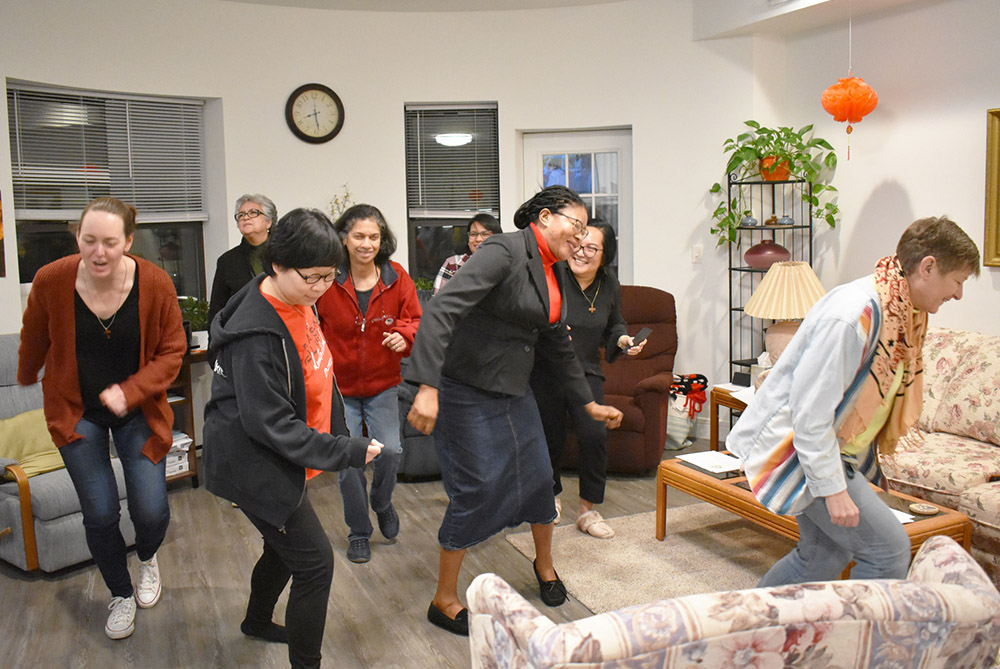
The novices — and the codirectors — enjoy dancing, including trying out the "Jerusalema Challenge" dance. (Julie A. Ferraro)
Part of that understanding involves the handling of conflicts. Maisie cited the use of various terms that differ in meaning between cultures. Not understanding how one of the other novices meant a certain statement early in the cohort year, for instance, could have led to enduring tension. After some weeks, Maisie opened up about her discomfort with the novice.
"If we didn't have a conversation, it could've been forever," she said of resolving the misunderstanding.
The fruit born of conflict, and how it is resolved, has solidified her trust in these peers in the program.
Rachel Dunlap traveled the shortest distance to the InterCongregational Collaborative Novitiate, coming originally from Keokuk, Iowa. She holds bachelor's degrees in psychology and theology from St. Ambrose University in Davenport, Iowa, and master's degrees in social work, and theology and ministry from Boston College.
As a novice with the Sisters of the Presentation of the Blessed Virgin Mary in Dubuque, Iowa, she appreciates the mind-body-spirit component of the formation, and being able to share American traditions with the other novices, while learning from them.
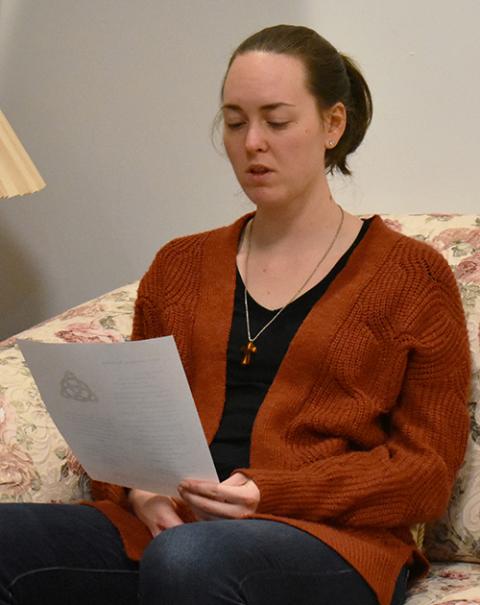
Rachel Dunlap, novice with the Sisters of the Presentation of the Blessed Virgin Mary, reads during evening prayer at the InterCongregational Collaborative Novitiate in Chicago. (Julie A. Ferraro)
"Sometimes, it's just a little every day, like learning how to use a bus in the city. Very simple things," she said. Thanksgiving, however, offered a larger chance to delve into the holiday's meaning, with the history and traditions around the meal explained in detail.
Rachel makes sure to ask questions, along with trying new foods or activities. "It's about always being open and not making assumptions about a culture."
A bit of a puzzle addict, she finds sitting at a table with one or more of the novices, working on a 1,000-piece puzzle a distinct type of fun. "Everyone contributes a little," she said.
The vitality of intercultural engagement extends to the novices' respective communities, as their home formators have observed. Loretto Sr. Claudia Calzetta wrote, "The most obvious asset is that the novice will learn eight different ways to understand the practice of spirituality within eight different congregations of women religious, rather than just the unique charism of her own religious community." She counts not only the six novices, but the two directors.
Sr. Lucy Cardet, of the Franciscan Sisters of Allegany, noted the "challenging and enlightening" aspects of living in community with others.
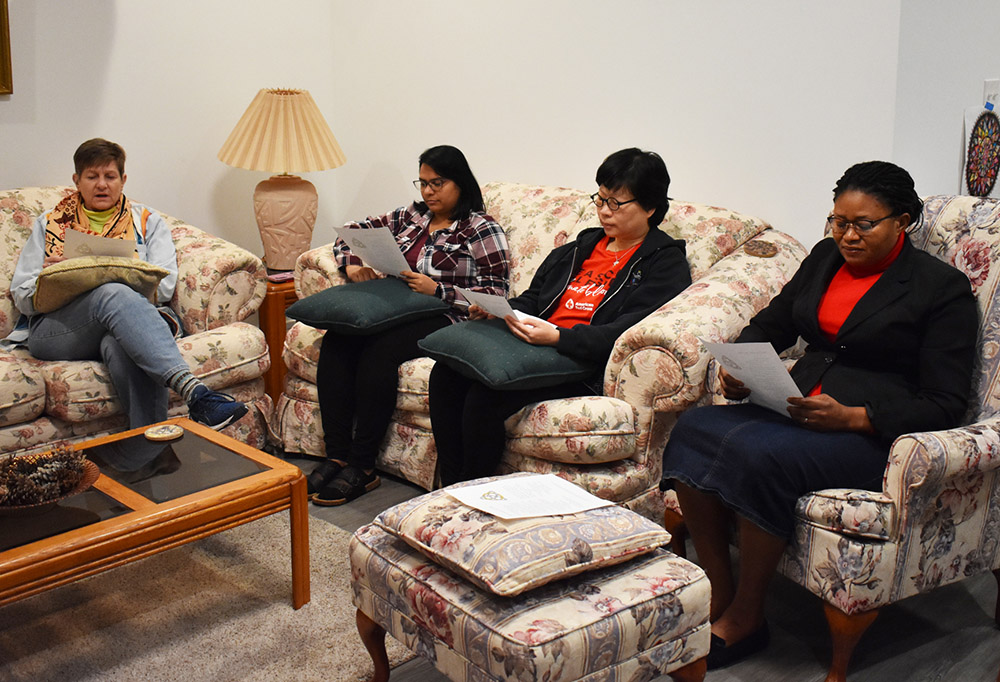
Sr. Nancy Gerth, left, participates in evening prayer at the InterCongregational Collaborative Novitiate with novices Maribah Ishaq, Maisie Ng and Juliana Wuur. (Julie A. Ferraro)
Presentation Srs. Rita Cameron and Joetta Venneman said they recognize how the intercongregational program broadens the novices' "perspective of the Divine and ways to find the Divine within community members," in a joint email. "This experience allows for [a] broader vision for the future, with connections to religious communities that may lead to collaboration and/or partnerships," they wrote. Being able to deepen their understanding of cultures, celebrations across cultures and prayer styles are essential to achieving harmony in communal living, as well.
The novices pray with the co-directors in the chapel on the garden level, or in the gathering space above. They use the People's Companion to the Breviary, with its inclusive language, or take turns preparing the prayers, drawing from their respective charisms, ending by holding hands in a circle and simultaneously reciting the Lord's Prayer, each in her native language, a tribute to their individual and communal life.
Sister Nancy expressed her gratitude being granted the opportunity to be part of this setting, where she says she has learned as much from the novices as they have from her. She credits the Religious Formation Conference for their support of the InterCongregational Collaborative Novitiate, and the board for making the program possible — and enriching.
What the novices will take away when they return to their various congregations this summer is what the two directors recognized all along, Sister Corrina said. "Interculturality and diversity is the way things are," with the InterCongregational Collaborative Novitiate serving as a "little laboratory" of what they will find when they embark on their ministries after professing their vows.

